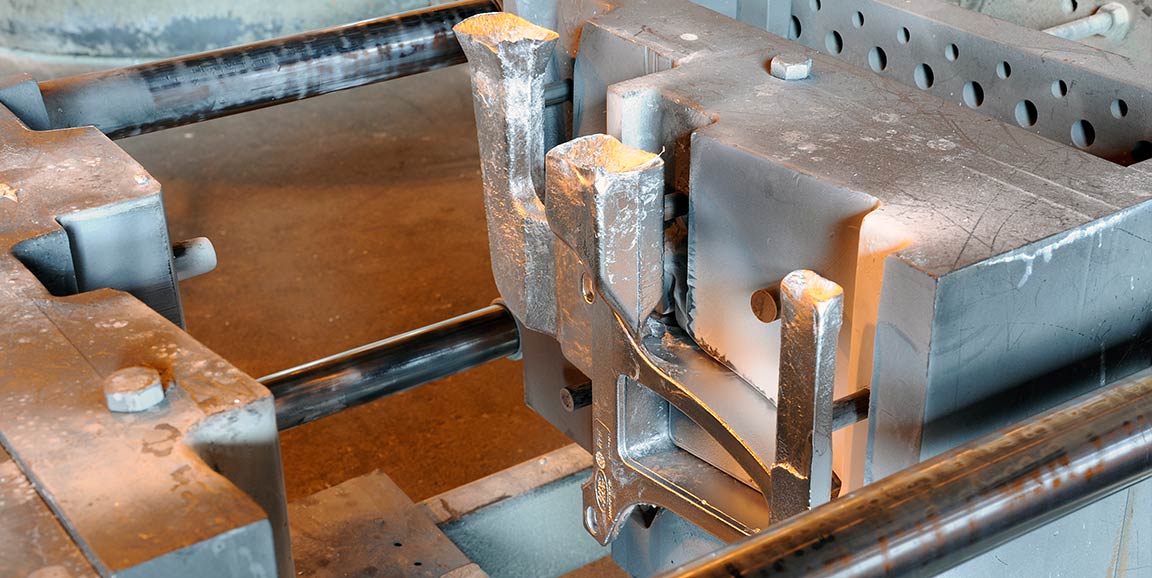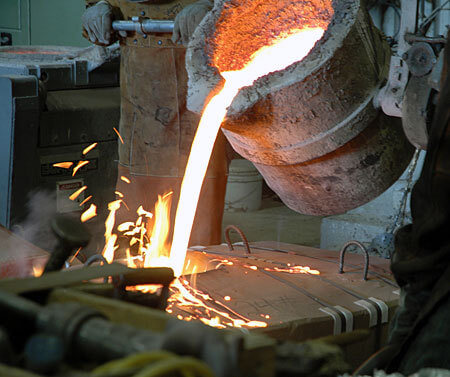Discover the Benefits of Aluminum Casting in Modern Production
Aluminum casting has become a pivotal process in modern-day production. Its lightweight yet robust nature offers considerable benefits for various industries. The capability to attain intricate styles and preserve limited resistances adds to its charm. Aluminum Foundry. Additionally, the cost-effectiveness and environmental advantages make it a lasting selection. As manufacturers seek ingenious options, the duty of aluminum casting remains to evolve. What certain applications and advantages wait for expedition in this vibrant area?
Solid yet lightweight: The Benefits of Aluminum
Although numerous materials are utilized in production, aluminum stands out due to its amazing combination of lightweight properties and outstanding stamina. This unique feature makes aluminum a suitable option for various applications, specifically in markets such as vehicle, aerospace, and building. Its reduced thickness allows for less complicated handling and transportation, adding to minimized energy intake during manufacturing and setting up procedures.
Aluminum's strength-to-weight ratio is remarkable, allowing suppliers to produce sturdy components without including unneeded bulk. This particular is specifically useful in industries where weight reduction can lead to enhanced gas efficiency and general performance. Additionally, aluminum's resistance to deterioration improves the long life of products, even more solidifying its appeal in modern manufacturing.
Ultimately, the light-weight yet strong nature of aluminum settings it as a preferred product, fostering technology and efficiency throughout several markets. Makers significantly recognize that these benefits can cause considerable advancements in design and functionality.
Precision and Complexity in Layout
As manufacturers embrace the capabilities of aluminum casting, they uncover brand-new avenues for precision and complexity in layout. This production process permits the development of complex forms and in-depth features that standard approaches typically struggle to attain. The fluidity of molten aluminum allows it to load complex molds, leading to parts with limited resistances and fine surface coatings.
This precision is specifically valuable in markets such as aerospace and vehicle, where precise specifications are essential for performance and safety. Aluminum casting additionally accommodates innovative designs that boost functionality without jeopardizing architectural stability.

Cost-Effectiveness and Performance
Cost-effectiveness and efficiency are vital factors to consider for manufacturers checking out aluminum casting as a production method. Aluminum casting offers considerable price benefits due to its reduced material prices contrasted to other steels (Precision aluminum casting). The light-weight nature of aluminum decreases delivery and handling expenditures, and its exceptional thermal conductivity permits quicker cooling times throughout the casting process, boosting total manufacturing speed
In addition, aluminum's convenience allows suppliers to produce complicated shapes and layouts, decreasing the demand for extra machining or assembly. This streamlining of manufacturing not just minimizes labor costs yet also shortens lead times, allowing business to react swiftly to market needs.
The toughness and corrosion resistance of aluminum spreadings add to longer item lifespans, lowering replacement costs over time. Consequently, producers can accomplish a balance of high-grade outcome and lowered functional expenditures, making aluminum casting a significantly appealing option in modern-day production.
Ecological Sustainability of Aluminum Casting
Aluminum casting stands apart as an ecologically lasting manufacturing choice, especially because of its recyclability and minimized ecological impact. The procedure enables the efficient use aluminum, a product that can be reused forever without shedding its residential or commercial properties. This particular substantially decreases the demand for virgin aluminum, therefore conserving natural deposits and decreasing power usage connected with extraction and processing.

Applications Throughout Industries: From Automotive to Aerospace
While diverse markets proceed to seek cutting-edge materials for production, aluminum casting has shown to be a flexible service across industries such as automotive and aerospace. In the auto sector, aluminum spreadings add to lightweight lorry designs, boosting fuel effectiveness and performance. Elements like engine blocks, transmission housings, and wheels profit from aluminum's strength-to-weight ratio.
Similarly, in aerospace, aluminum casting plays a considerable role in creating complex components that call for high toughness and reduced weight. Airplane components such as braces, touchdown gear, and structural frameworks use aluminum for peak performance and safety and security.
Additionally, the flexibility of aluminum casting permits it to satisfy various other markets, consisting of consumer electronics, marine, and industrial machinery. This versatility not just fulfills the specific needs of different applications however also supports recurring development in making processes. Because of this, aluminum casting continues to be a principal in contemporary manufacturing across numerous markets.
Regularly Asked Questions
How Does Aluminum Casting Compare to Various Other Metal Casting Procedures?
Aluminum casting offers exceptional strength-to-weight proportions, faster cooling rates, and excellent corrosion resistance compared to other metal casting procedures. These advantages make it perfect for numerous applications, boosting efficiency and performance more info here in manufacturing.
What Are the Normal Lead Times for Aluminum Casting Projects?
Common lead times for aluminum casting jobs range from 2 to 8 weeks, relying on elements such as complexity, order size, and production capability. Effective planning can assist decrease hold-ups and boost task timelines.
Can Aluminum Casting Be Utilized for Intricate Styles?
Aluminum casting can indeed accommodate complex styles. aluminum casting. Its fluidity enables in-depth patterns and shapes, making it suitable for complex parts in various markets. This adaptability enhances style liberty while preserving structural integrity and performance
What Post-Processing Options Are Available After Aluminum Casting?
Post-processing alternatives for aluminum casting include machining, polishing, surface treatments, anodizing, and welding. These techniques improve the finish, improve dimensional precision, and boost rust resistance, thus enhancing the end product's performance and visual allure.
Just How Do Temperature Level Changes Impact Aluminum Casting Quality?
Temperature modifications considerably impact aluminum casting quality by affecting fluidity, solidification prices, and possible issues. Rapid cooling can result in increased brittleness, while extreme heat may create bending or insufficient filling of mold and mildews throughout casting.
Aluminum casting has arised as an essential process in contemporary production. As suppliers accept the capabilities of aluminum casting, they find brand-new avenues for precision and intricacy in design. Aluminum casting procedures usually generate fewer greenhouse gas discharges contrasted to other steel description casting techniques. While varied markets proceed to look for ingenious products for manufacturing, aluminum casting has actually proven to be a flexible service throughout industries such as automotive and aerospace. In the vehicle market, aluminum spreadings contribute to light-weight vehicle styles, improving fuel efficiency and performance.